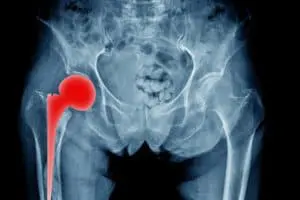 A study published in The Journal of Bone & Joint Surgery found that the rate of repeat surgery in patients younger than 65 who undergo total hip replacement has significantly increased. The study’s findings were reported by eurekalert.org.*
A study published in The Journal of Bone & Joint Surgery found that the rate of repeat surgery in patients younger than 65 who undergo total hip replacement has significantly increased. The study’s findings were reported by eurekalert.org.*
The study, conducted by several doctors at Cedars-Sinai Medical Center, focused on data from total hip arthroplasty (THA) procedures in the United States between 2007 and 2013. The authors sought to discern how many people who previously underwent THA required a repeat surgery during those years. While the researchers noticed an overall trend of decreased revision surgeries from 2007 to 2013, they also found that the number of revisions sharply rose for one particular age group: patients age 45 to 64.
Patients who opt for THA typically have arthritis or injuries that have caused damages to their hips. During the surgical procedure, the damaged portions of the hip joint are removed and replaced with a prosthetic ball-and-socket implant system. There are numerous brands of implants available, and they contain several components made of various materials, like polyethylene (plastic), ceramic, and metal.
Historically, most THA procedures are performed on patients 65 years of age or older. Throughout the years, however, more and more young patients are undergoing the procedure. By analyzing more than 300,000 THA revision procedures between 2007 and 2013, researchers found that revisions were overall trending up 12 percent. However, that trend was entirely isolated to younger patients. The revision rate for patients age 45 to 64 increased by 30 percent (adjusted for population growth) during the six-year period, while revisions for every other age group decreased.
In addition to the changes in revision rates, the medical reasons for the revisions changed throughout the study period, as well. At the beginning of the period, patients primarily required repeat surgeries because of dislocations. At the end of the study period, the most common reason for revision surgeries was “other mechanical complication of prosthetic joint.”
The study authors opined that the trend in younger patients and the change in reasons for repeat surgeries might have been prompted by two factors. First, it could be due to a high number of metal-on-metal hip implants placed in younger patients during those years and the years prior. “Metal-on-metal” means the primary components of the hip implant are both made of metal. Younger patients tended to receive these implants more than older patients, and patients who received metal-on-metal implants experienced higher rates of complication. This was purportedly due to reactions patients had with the metal material (referred to as “metallosis”).
Second, the authors believed the study findings could be attributed to the ages of the younger patients themselves. Patients in the 45-to-64 age group typically have anticipated life expectancies of 20 years or longer. This means they will frequently outlive the usefulness of their implants. The prostheses will wear out and start to fail as patients age, and patients will then require repeat procedures to replace the implants.
Revisions due to metal-on-metal implants should likely trend down going forward, as these implants have largely been phased out of THA practice. But the ages of patients present a new challenge and a directional focus for designers and manufacturers of prosthetic hip implants: With more young patients undergoing THA, longer-lasting prostheses options need to be on the market.
In their analysis of THA revision procedures, the study authors also found that the duration of hospital stays, and the costs of those hospital stays were lower in 2013 than 2007. Additionally, the rate of complications associated with THA revisions was lower in 2013. Senior author Guy Paiement, M.D., said that while THA revisions were “a lot safer and more successful” than they were 20 years ago, the medical community needed to “continue improving techniques and implants.”
Contact Parker Waichman LLP for Your Free Case review Today
The dedicated and experienced attorneys at Parker Waichman LLP provide free case evaluations at no cost to you. To find out more, call 1-800-YOURLAWYER (1-800-968-7529), or submit your information through our online contact form.
[sc name=”post-footers”]